Real-Time Electrical Energy Optimization in E-Commerce Systems Based on IoT and Mobile Agents
Abstract
1. Introduction
- ✓
- Sensing Layer: This layer is devoted to data collecting and consists of embedded devices such as sensors and actuators. These gadgets collect environmental data that is essential to system functioning.
- ✓
- Network Layer: This layer employs short- and medium-range communication systems such as Wi-Fi, Bluetooth, and Zigbee and integrates long-range communication systems such as LoRaWAN and cellular networks (4G/5G) for wide geographic coverage. Strong security measures include encryption and authentication protocols for the exchange of data.
- ✓
- Data Processing Layer: Primarily cloud-based, this layer performs intensive data analysis to derive actionable insights. It supports advanced computational operations using data management systems, machine learning algorithms, and data lakes that store large volumes of raw data.
- ✓
- Application Layer: In this layer, development could be carried out in an endless array of general-purpose programming environments, such as Python, Java, MATLAB, or other domain-specific tools, depending on the application requirements. Any information about specific versions has been omitted to accommodate improvements made across the various platforms.
2. Related Work
2.1. Energy Optimization in IoT and E-Commerce Logistics
2.2. Machine Learning in Retail Logistics
2.3. Smart Distribution in Industrial IoT with Blockchain Technology
2.4. Logistics Routing with Multi-Agent Systems
2.5. IoT Applications in Warehouse Logistics Management
2.6. Energy Efficiency in the Retail Sector Through Policy and Demand-Side Strategies
2.7. Demand-Side Energy Management Models in Smart Retail Cities
2.8. Energy Optimization in Supermarkets Using IoT-Based REMS
2.9. Smart Grid Energy Management Through AI, IoT, and Blockchain Technology
3. Materials and Methods
3.1. Algorithm 1: Optimized Energy Management in IoT-Driven E-Commerce Using Mobile Agents
| Algorithm 1. Optimized Energy Management in IoT-Driven E-commerce |
| import time def initialize_system(devices): for device in devices: device.update({‘status’: ‘active’, ‘energy_level’: 100, ‘task_history’: []}) def select_optimal_device(devices, task): eligible = [d for d in devices if d[‘energy_level’] > 20 and d[‘proximity’] == task[‘location’]] return max(eligible, key=lambda d: (d[‘energy_level’], -len(d[‘task_history’]))) if eligible else None def allocate_tasks(devices, tasks): for task in tasks: if (device:= select_optimal_device(devices, task)): device[‘energy_level’] -= task[‘energy_required’] device[‘task_history’].append(task[‘id’]) print(f”Task {task[‘id’]} assigned to Device {device[‘id’]}.”) else: print(f”[WARNING] No device found for Task {task[‘id’]}.”) def report_status(devices, server): server[‘log’] = [{‘id’: d[‘id’], ‘energy’: d[‘energy_level’], ‘tasks’: d[‘task_history’]} for d in devices] print(f”Status updated for {len(devices)} devices.”) def recharge_devices(devices): for d in devices: if d[‘energy_level’] < 25: time.sleep(1) d[‘energy_level’] = 100 print(f”Device {d[‘id’]} recharged.”) def main(): devices = [{‘id’: i+1, ‘proximity’: p, ‘energy_level’: e} for i, (p, e) in enumerate([(‘A’, 80), (‘B’, 50), (‘A’, 90)])] tasks = [{‘id’: f’T{i+1}’, ‘energy_required’: r, ‘location’: l} for i, (r, l) in enumerate([(30, ‘A’), (40, ‘B’), (50, ‘A’)])] server = {} initialize_system(devices) allocate_tasks(devices, tasks) report_status(devices, server) recharge_devices(devices) print(“[FINAL LOG]:”, server[‘log’]) main() |
3.2. Architecture of Proposed System
3.3. Types of Agents
3.4. Flow Chart of the Proposed Model
4. Results
4.1. Performance Evaluation of IoT-Driven E-Commerce Solutions
4.1.1. Experimental Setup and Parameters
4.1.2. Selection Criteria and Parameter Justification
4.1.3. Energy Efficiency Improvements and Optimization
4.1.4. Operational Cost Reduction
4.1.5. System Scalability
4.1.6. Real-Time Responsiveness
4.1.7. Generalizability of Results Across Operational Scenarios
4.2. Mobile Agent’s Creation and Integration
4.2.1. Creating Mobile Agents
4.2.2. Interactions Between Agents
5. Discussion
6. Limitations of the Proposed System
6.1. Technical and Operational Constraints
6.2. Absence of Real-World Implementation
7. Conclusions and Broader Implications
Author Contributions
Funding
Institutional Review Board Statement
Informed Consent Statement
Data Availability Statement
Acknowledgments
Conflicts of Interest
References
- Goyat, R.; Kumar, G.; Conti, M.; Devgun, T.; Saha, R.; Thomas, R. BENIGREEN: Blockchain-Based Energy-Efficient Privacy-Preserving Scheme for Green IoT. IEEE Internet Things J. 2023, 10, 16480–16493. [Google Scholar] [CrossRef]
- Aravind, K.; Maddikunta, P.K.R. Dingo Optimization Based Cluster Based Routing in Internet of Things. Sensors 2022, 22, 8064. [Google Scholar] [CrossRef]
- Manivannan, R.; Kalaiselvi, S.; Anitha Elavarasi, S. An IOT based environment conscious green score meter towards Smart Sustainable Cities. Sustain. Comput. Inform. Syst. 2023, 37, 100839. [Google Scholar] [CrossRef]
- Zawish, M.; Ashraf, N.; Ansari, R.I.; Davy, S. Energy-Aware AI-Driven Framework for Edge-Computing-Based IoT Applications. IEEE Internet Things J. 2023, 10, 5013–5023. [Google Scholar] [CrossRef]
- Shili, M.; Anwar, S. Leveraging Agent-Based Modeling and IoT for Enhanced E-Commerce Strategies. Information 2024, 15, 680. [Google Scholar] [CrossRef]
- Taneja, A.; Rani, S. A Novel Energy Conservation Scheme for IoT-Based Wireless Networks: A Use Case of E-Commerce Systems for Consumer Electronics. IEEE Trans. Consum. Electron. 2024, 70, 1648–1655. [Google Scholar] [CrossRef]
- Ghiasi, M.; Wang, Z.; Mehrandezh, M.; Jalilian, S.; Ghadimi, N. Evolution of Smart Grids towards the Internet of Energy: Concept and Essential Components for Deep Decarbonisation. IET Smart Grid 2023, 6, 86–102. [Google Scholar] [CrossRef]
- Begum, B.A.; Nandury, S.V. A Survey of Data Aggregation Protocols for Energy Conservation in WSN and IoT. Wirel. Commun. Mob. Comput. 2022, 8765335. [Google Scholar] [CrossRef]
- Chreim, B.; Esseghir, M.; Merghem-Boulahia, L. Energy management in residential communities with shared storage based on multi-agent systems: Application to smart grids. Eng. Appl. Artif. Intell. 2003, 126, 106886. [Google Scholar] [CrossRef]
- Xu, W.; Xu, H. Channel Encroachment and Carbon Reduction with Demand Information Asymmetry. J. Clean. Prod. 2022, 371, 133443. [Google Scholar] [CrossRef]
- Lydia, E.L.; Jovith, A.A.; Devaraj, A.F.S.; Seo, C.; Joshi, G.P. Green Energy Efficient Routing with Deep Learning-Based Anomaly Detection for Internet of Things (IoT) Communications. Mathematics 2021, 9, 500. [Google Scholar] [CrossRef]
- ZAlsharif, M.H.; Kim, S.; Kuruoğlu, N. Energy harvesting techniques for wireless sensor networks/radio-frequency identification: A review. Symmetry 2019, 11, 865. [Google Scholar] [CrossRef]
- Popli, S.; Jha, R.K.; Jain, S. A Survey on Energy Efficient Narrowband Internet of Things (NBIoT): Architecture, Application and Challenges. IEEE Access 2018, 7, 16739–16776. [Google Scholar] [CrossRef]
- Kouah, S.; Saighi, A.; Ammi, M.; Naït Si Mohand, A.; Kouah, M.I.; Megías, D. Internet of Things-Based Multi-Agent System for the Control of Smart Street Lighting. Electronics 2024, 13, 3673. [Google Scholar] [CrossRef]
- Prasad, V.K.; Dansana, D.; Bhavsar, M.D.; Acharya, B.; Gerogiannis, V.C.; Kanavos, A. Efficient Resource Utilization in IoT and Cloud Computing. Information 2023, 14, 619. [Google Scholar] [CrossRef]
- Delicato, F.C.; Vandelli, T.; Bonicea, M.; Farias, C.M.d. Heracles: A Context-Based Multisensor Sensor Data Fusion Algorithm for the Internet of Things. Information 2020, 11, 517. [Google Scholar] [CrossRef]
- Bhumichai, D.; Smiliotopoulos, C.; Benton, R.; Kambourakis, G.; Damopoulos, D. The Convergence of Artificial Intelligence and Blockchain: The State of Play and the Road Ahead. Information 2024, 15, 268. [Google Scholar] [CrossRef]
- Alshohoumi, F.; Sarrab, M.; AlHamadani, A.; Al-Abri, D. Systematic review of existing IoT architectures security and privacy issues and concerns. Int. J. Adv. Comput. Sci. Appl. 2019, 10, 232–251. [Google Scholar] [CrossRef]
- Rudrakar, S.; Rughani, P. IoT-Based Agriculture (Ag-IoT): A Detailed Study on Architecture, Security and Forensics. Inf. Process. Agric. 2024, 11, 524–541. [Google Scholar] [CrossRef]
- Zhang, Y.; Yu, H.; Zhou, W.; Man, M. Application and Research of IoT Architecture for End-Net-Cloud Edge Computing. Electronics 2023, 12, 1. [Google Scholar] [CrossRef]
- Wang, K.; Bae, K.H. In-Depth Learning Layout and Path Optimization of Energy Service Urban Distribution Sites under e-Commerce Environment. Complexity 2021, 2021, 6665610. [Google Scholar] [CrossRef]
- Elhoseny, M.; Siraj, M.; Haseeb, K.; Nawaz, M.; Altamimi, M.; Alghamdi, M.I. Energy-Efficient Mobile Agent Protocol for Secure IoT Sustainable Applications. Sustainability 2022, 14, 8960. [Google Scholar] [CrossRef]
- Basappa, P.S.; Gangadhar, S.; Thanuja, T.C. Energy-efficient data-aggregation for optimizing quality of service using mobile agents in wireless sensor network. Int. J. Electr. Comput. Eng. 2022, 12, 3891–3899. [Google Scholar] [CrossRef]
- Hamza, M.A.; Al-Otaibi, S.; Althahabi, S.; Alzahrani, J.S.; Mohamed, A.; Motwakel, A.; Eldesouki, M.I. Improved Chameleon Swarm Optimization-Based Load Scheduling for IoT-Enabled Cloud Environment. Comput. Syst. Sci. Eng. 2023, 46, 1371–1383. [Google Scholar] [CrossRef]
- Mansour, M.; Elhassan, A. IoT-Based Real-Time Energy Management in Supermarkets: A Case Study in HVAC and Lighting Optimization. Sustain. Comput. Retail. Syst. 2024, 9, 122–134. [Google Scholar]
- Oluokun, O.A.; Adekunle, T.; Ibrahim, M.; Afolabi, K.; Olatunji, B. Enhancing Energy Efficiency in Retail through Policy-Driven Energy Audits and Conservation Measures. Int. J. Multidiscip. Res. Growth Eval. 2024, 5, 980–993. [Google Scholar] [CrossRef]
- Mithul Raaj, A.T.; Balaji, B.; Sai Arun Pravin, R.R.; Rani Chinnappa, N.; Rajesh Kumar, M.; Prakash, R.; Sujatha, R.; Vaegae Naveen, K.; Geetika, A.; Arooj Mubashara, S. Intelligent Energy Management across Smart Grids Deploying 6G IoT, AI, and Blockchain in Sustainable Smart Cities. IoT 2024, 5, 560–591. [Google Scholar] [CrossRef]
- Saengsikhiao, P.; Prapaiporn, C.; Taweekun, J. The Optimization of Chillers Air-Conditioning in Thailand Supermarkets using a Retail Energy Management System (REMS). J. Adv. Res. Fluid Mech. Therm. Sci. 2024, 118, 62–73. [Google Scholar] [CrossRef]
- Mahesh, R.; Anilkumar, K.B. IoT Blockchain-Based Smart Grid Energy Management: Innovations and Applications. In Applying Internet of Things and Blockchain in Smart Cities; IGI Global: Hershey, PA, USA, 2024; pp. 99–130. [Google Scholar] [CrossRef]

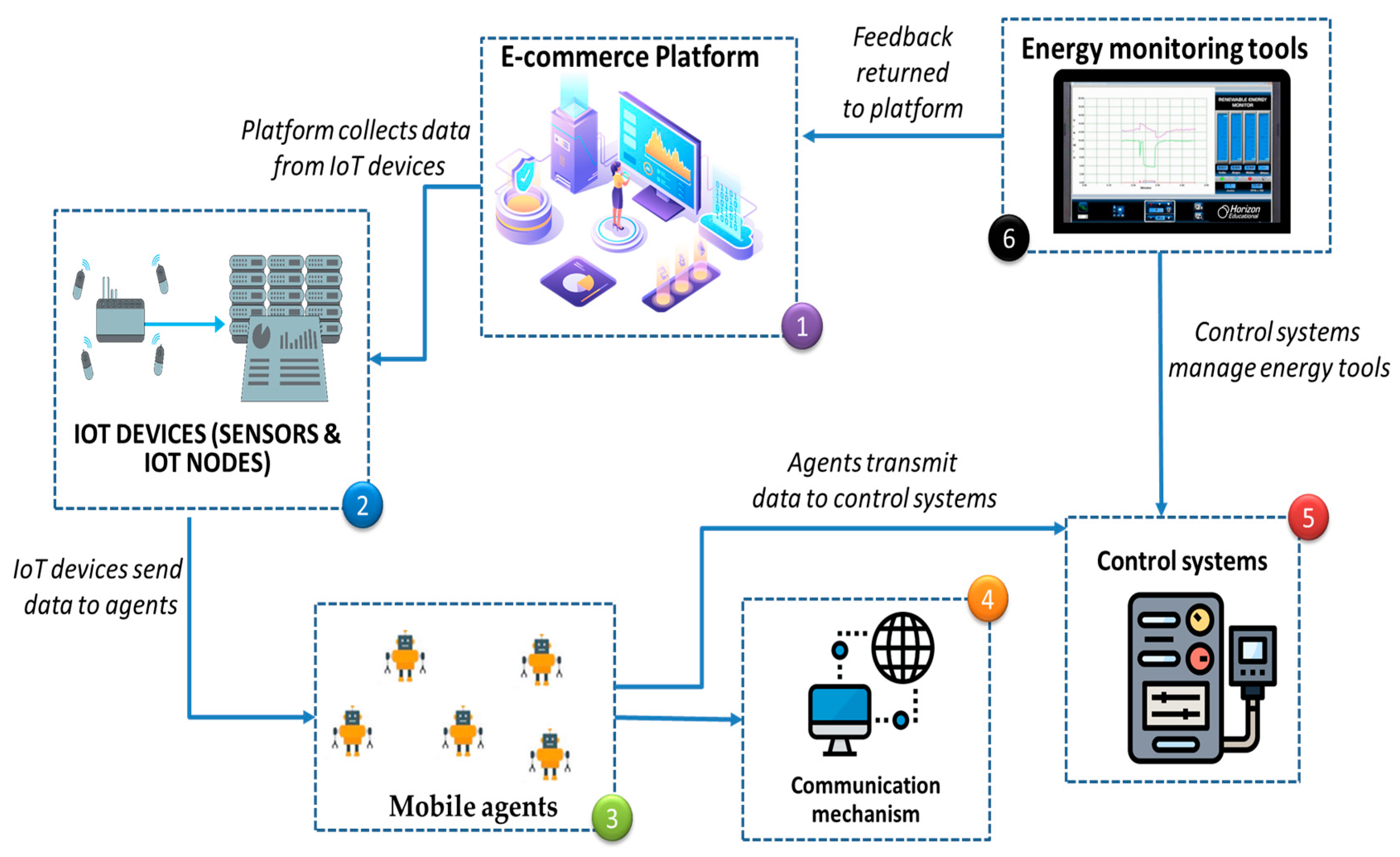
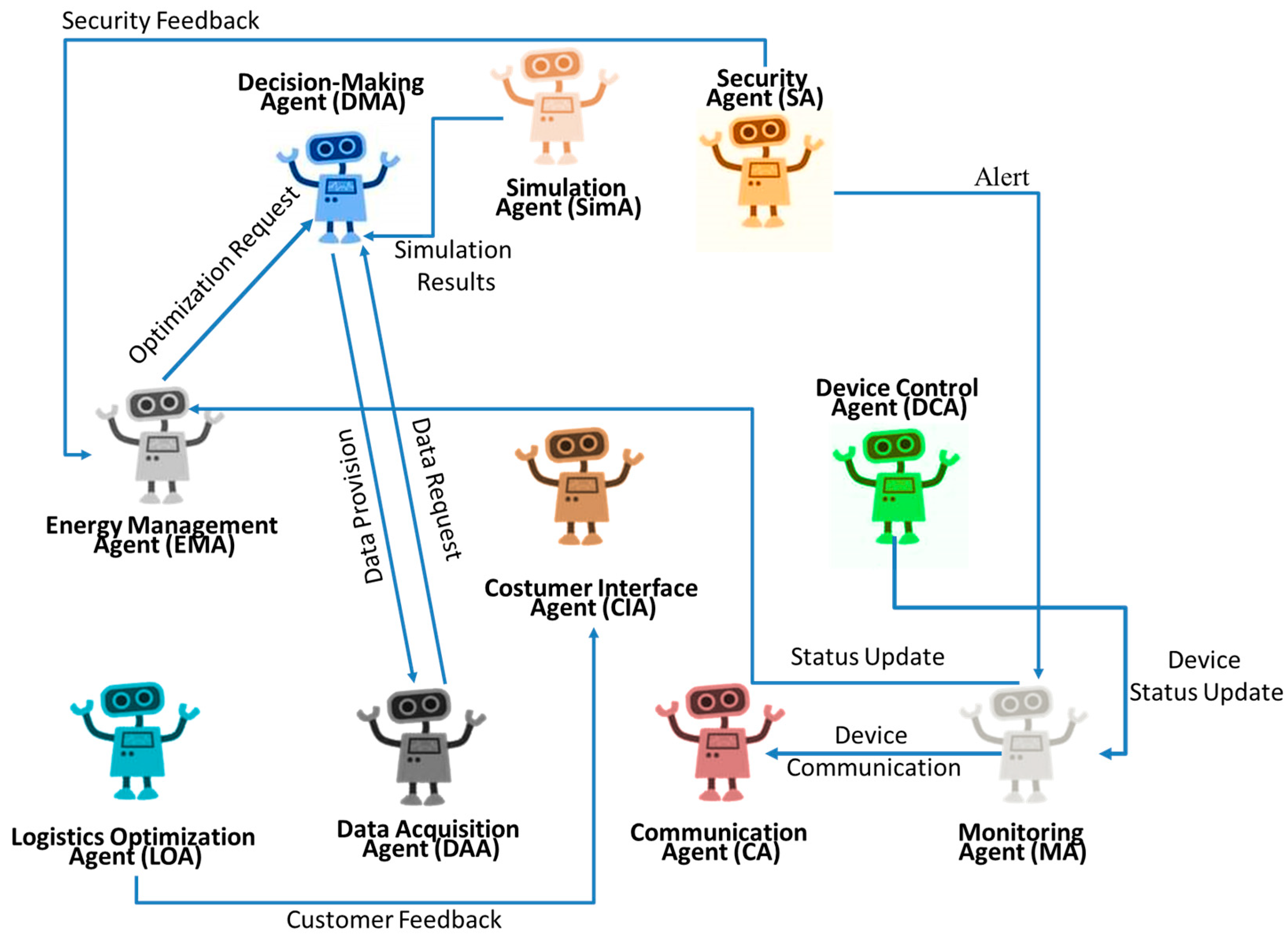
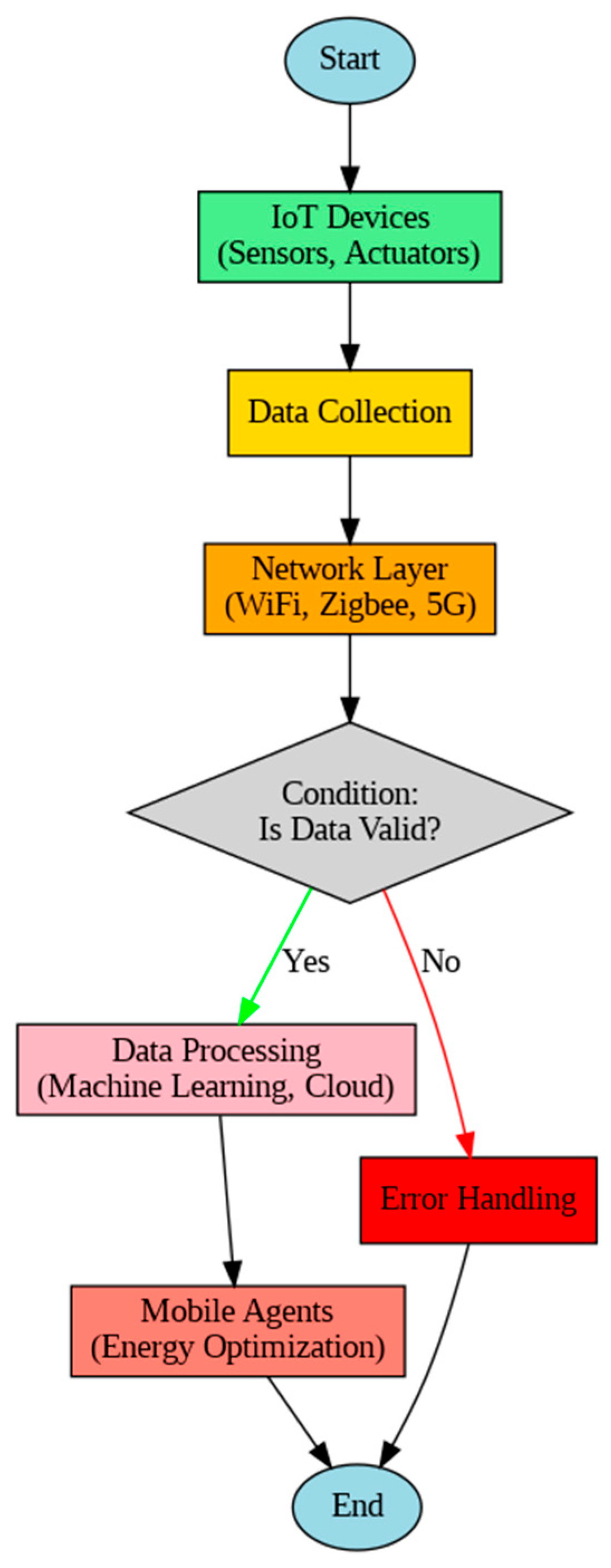
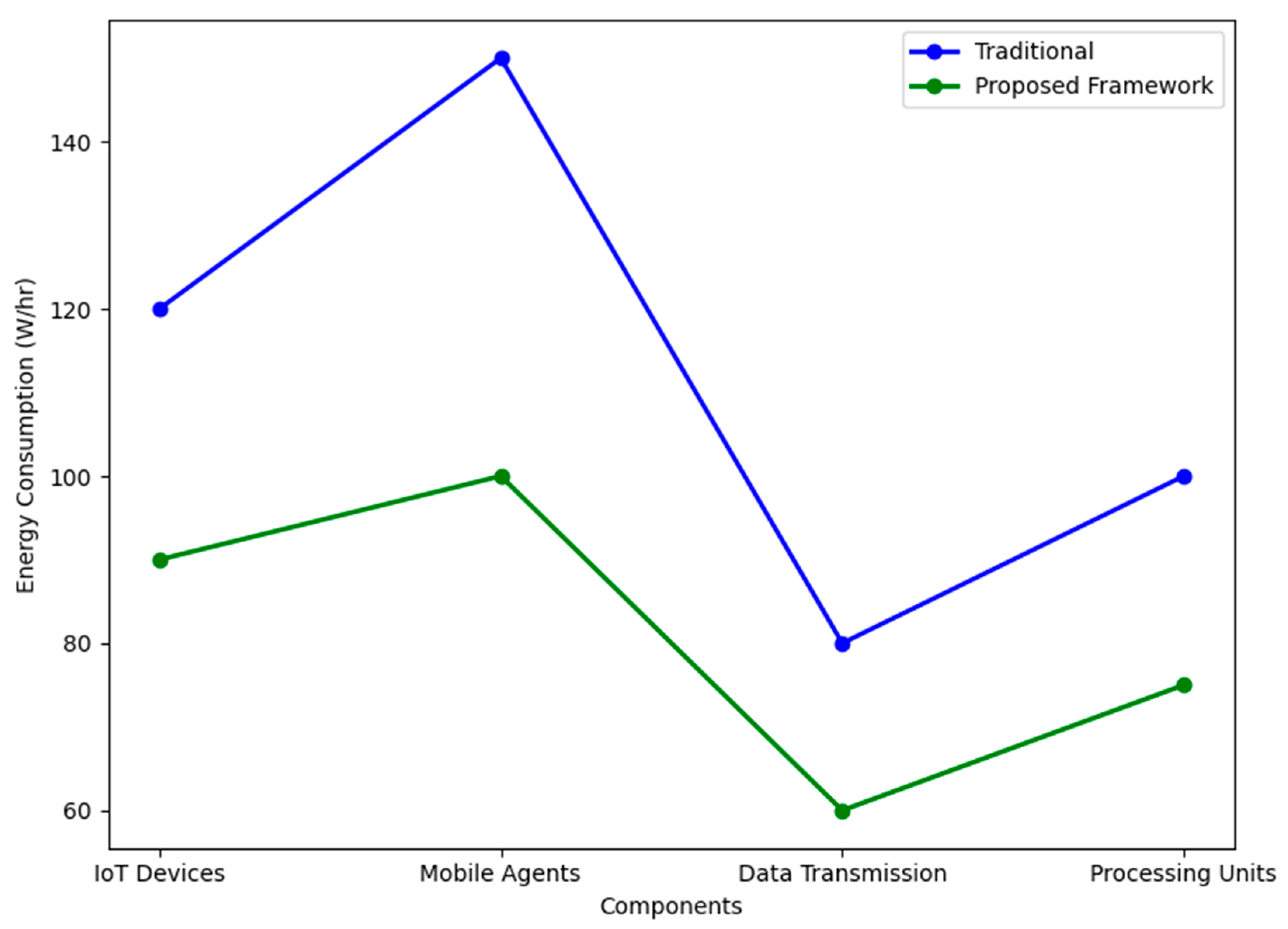

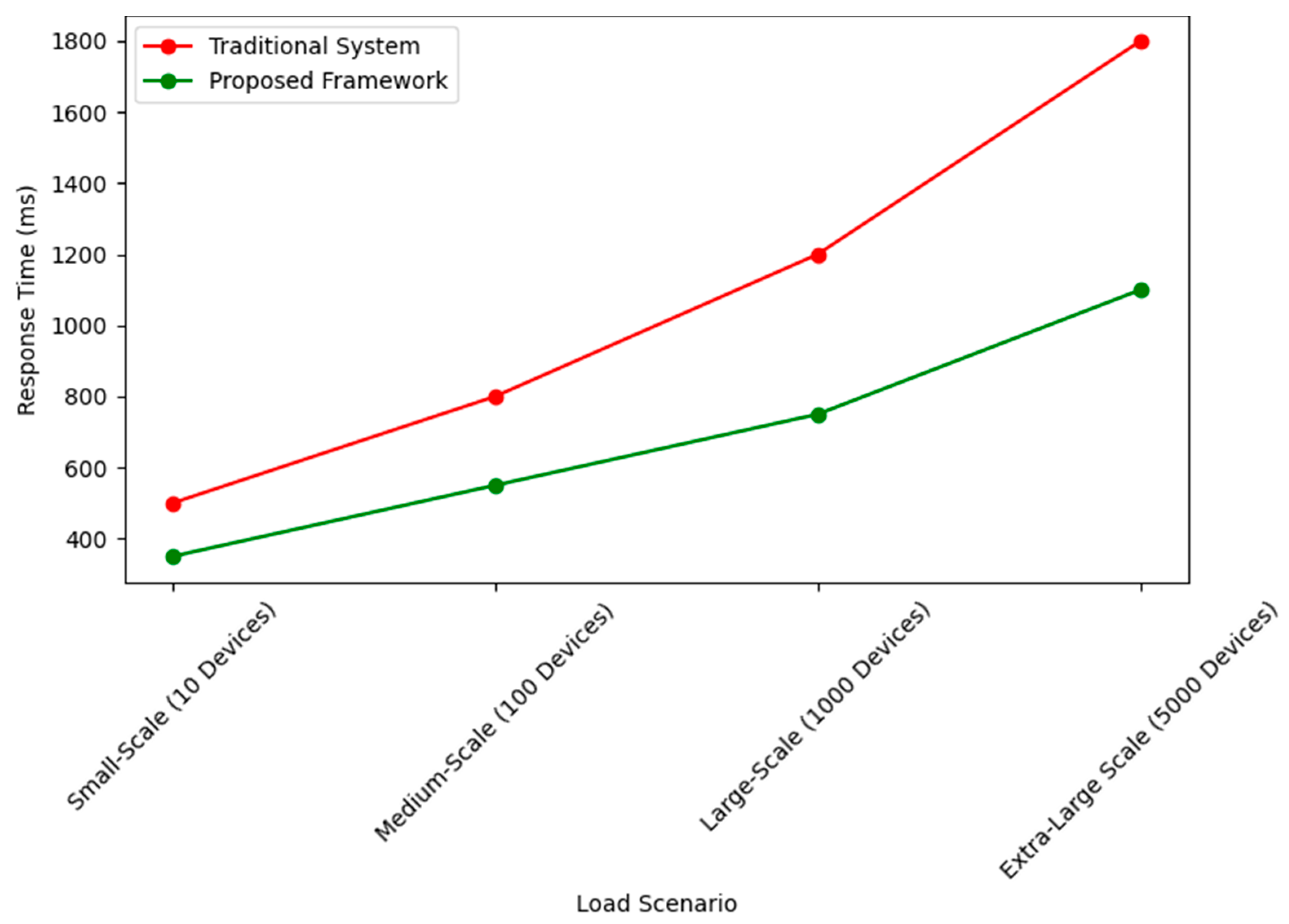
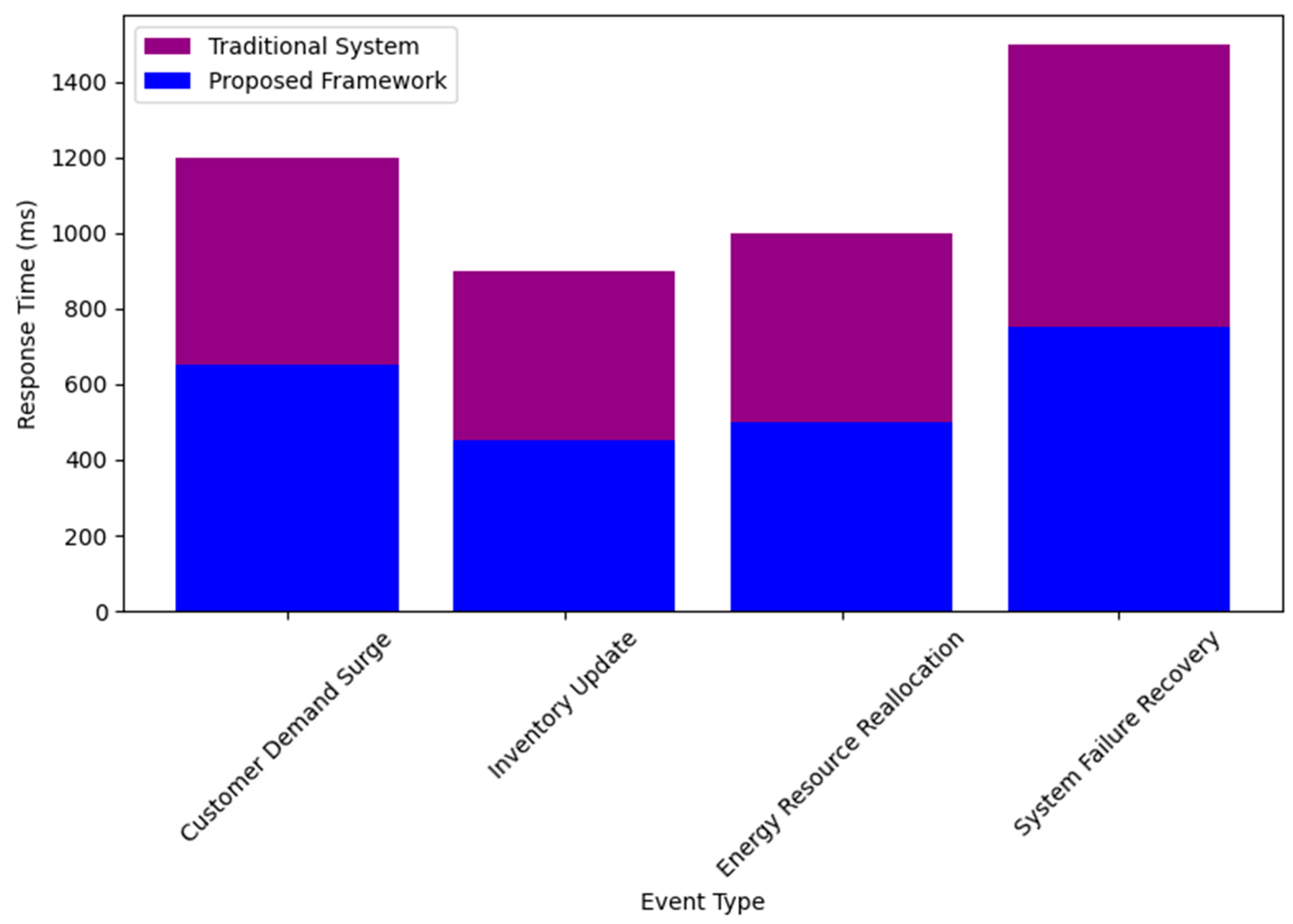
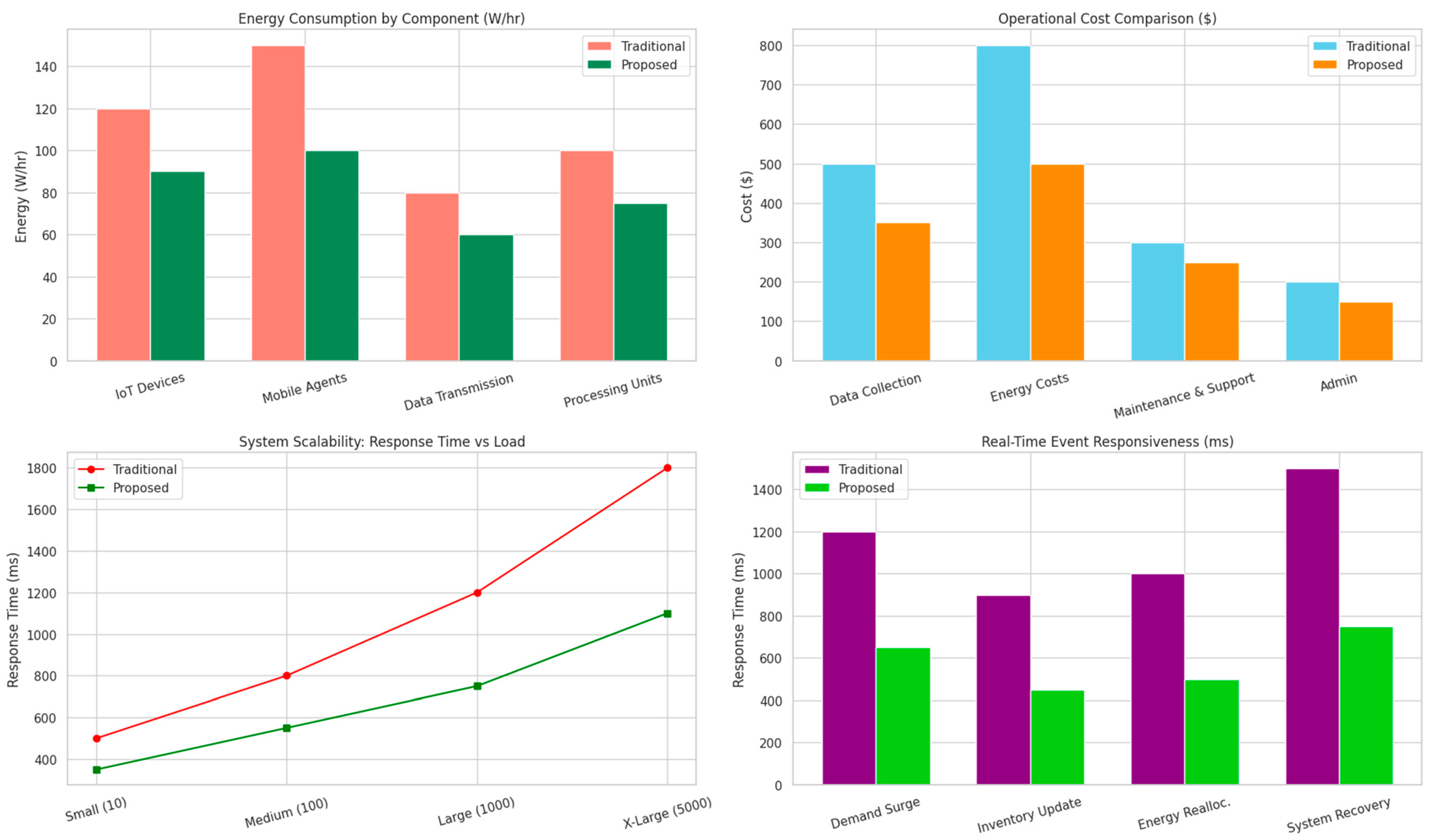

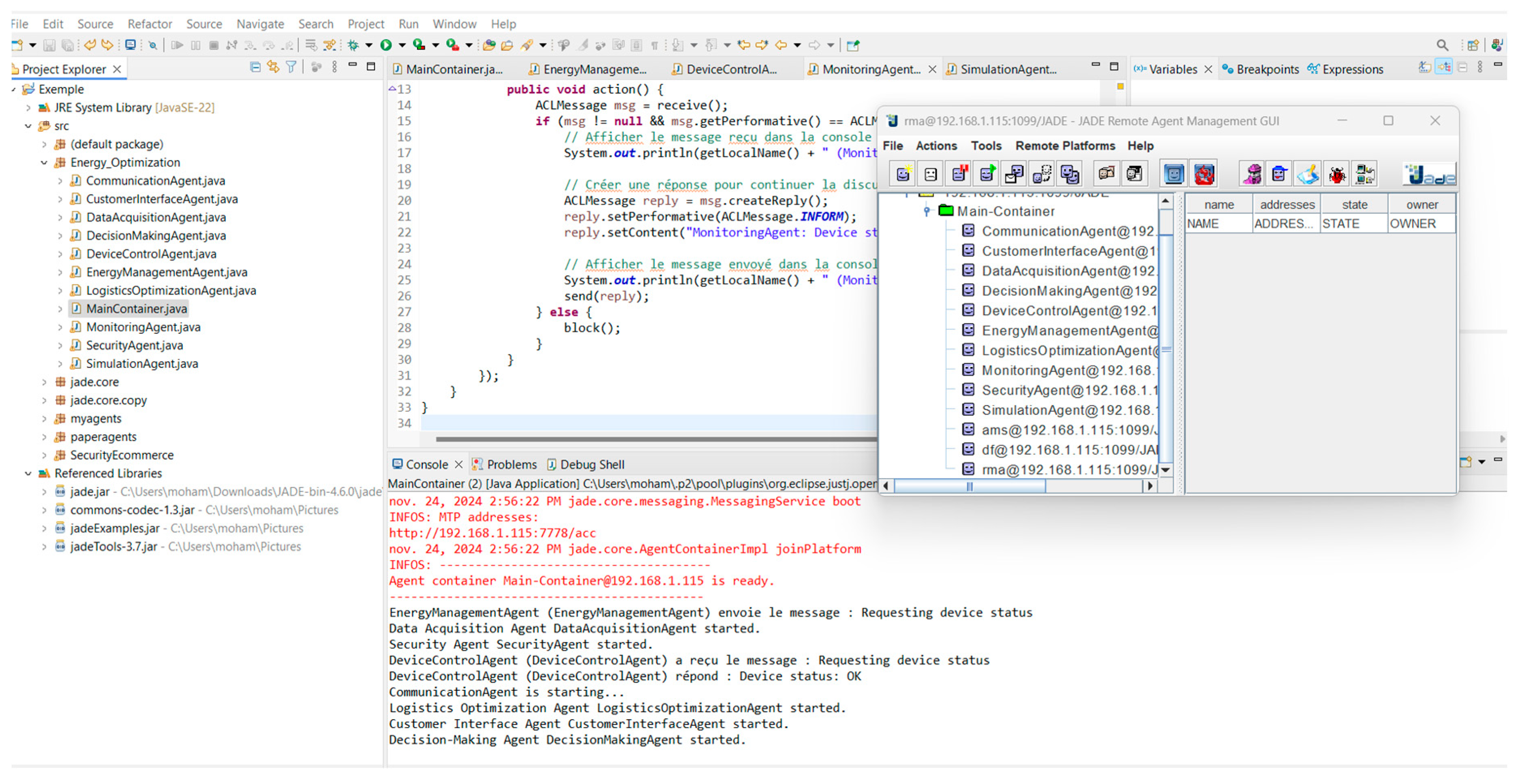
| Authors | Technique Used | Adaptation | Latency Improvement (%) | Mobile Agent | Energy Savings (%) | Performance | Scalability |
|---|---|---|---|---|---|---|---|
| [20] | IoT-based sensor network for real-time tracking. | √ | × | √ | × | √ | × |
| [21] | Machine learning with IoT integration for predictive analytics. | √ | √ | × | √ | √ | × |
| [22] | Mobile agent system for dynamic task allocation. | × | √ | √ | × | √ | × |
| [23] | Hybrid IoT and mobile agent framework for e-commerce optimization. | × | √ | √ | √ | × | √ |
| [24] | IoT-based REMS for energy management in supermarkets. | √ | × | √ | × | √ | × |
| [25] | Policy-based DSM in retail, with energy audits and conservation (e.g., HVAC, LEDs). | √ | × | × | 15% | × | √ |
| [26] | DSM aggregator model with deep learning for forecasting in smart cities. | √ | × | × | × | √ | √ |
| [27] | RFID-based IoT system for product inventory tracking. | √ | × | × | 17% | √ | √ |
| [28] | Multi-agent AI-IoT-blockchain smart grid architecture. | √ | × | × | 21% | ||
| Proposed Approach | The approach uses mobile agents in IoT-driven e-commerce to optimize energy use through data analysis, task management, and decision making. | √ | 27.78% | √ | 38.89% | √ | √ |
| N | Component | Description |
|---|---|---|
| 1 | E-commerce platform | The platform that manages products, customers, transactions, and recommendations, allowing personalized customer interactions and integrating IoT data for energy optimization. |
| 2 | IoT devices (sensors and IoT nodes) | Devices that collect environmental data (temperature, humidity, energy consumption) and IoT nodes for local data processing and aggregation. |
| 3 | Mobile agents | Autonomous software entities that analyze data and make decisions to optimize energy consumption in the e-commerce environment. |
| 4 | Communication mechanism | Mechanism for secure data transmission between IoT devices, the e-commerce platform, and mobile agents, ensuring communication between all components. |
| 5 | Control systems | Systems that implement actions prescribed by mobile agents to optimize energy consumption, such as turning off equipment or adjusting temperature. |
| 6 | Energy monitoring tools | Tools that visualize and analyze energy consumption, providing reports and visualizations to identify energy optimization opportunities. |
| Agent Name | Primary Role |
|---|---|
| Data Acquisition Agent (DAA) | Collects data from IoT devices integrated into the system. |
| Energy Management Agent (EMA) | Analyzes energy data to optimize consumption. |
| Security Agent (SA) | Ensures the protection of sensitive data and secure communications. |
| Device Control Agent (DCA) | Manages IoT devices by adjusting their parameters or states. |
| Monitoring Agent (MA) | Monitors system performance and detects anomalies. |
| Communication Agent (CA) | Manages communication between agents and external systems. |
| Simulation Agent (SimA) | Conducts simulations to predict the impacts of energy management strategies. |
| Logistics Optimization Agent (LOA) | Optimizes energy-intensive logistics processes such as transportation and warehousing. |
| Costumer Interface Agent (CIA) | Provides a costumer interface for system monitoring and configuration input. |
| Decision-Making Agent (DMA) | Coordinates strategic decisions to ensure alignment with global goals. |
| Parameter | Description |
|---|---|
| Simulation Environment | Custom Python-based simulation framework. |
| Agent Framework | JADE (Java agent development framework) for multi-agent system implementation. |
| Number of Agents | Five agents: DAA, EMA, DCA, MA, and DMA. |
| Agent Functions | Data collection, energy analysis, device control, monitoring, decision-making. |
| Operational Zones | Two zones (A and B), simulating e-commerce warehouse or logistics areas. |
| Number of Devices | Three IoT devices with unique IDs and location tags (e.g., Zone A or B). |
| Energy Requirement per Task | A range of 30–50 W/h, depending on task type (inventory, environment, logistics). |
| Energy Threshold for Tasking | A ≥20% energy required to accept new tasks. |
| Recharge Trigger Level | The device is recharged if energy drops below 25%. |
| Simulation Duration | A 48 h per test scenario, with 1 min time steps. |
| Performance Metrics | Energy consumption (W/h), task success rate, agent response latency, real-time adaptability. |
| Component | Energy Consumption (Traditional) | Energy Consumption (Proposed Framework) | Energy Savings (%) |
|---|---|---|---|
| IoT Devices | 120 W/h | 90 W/h | 25% |
| Mobile Agents | 150 W/h | 100 W/h | 33.33% |
| Data Transmission | 80 W/h | 60 W/h | 25% |
| Processing Units | 100 W/h | 75 W/h | 25% |
| Total Energy Usage | 450 W/h | 325 W/h | 27.78% |
| Cost Category | Traditional System (USD) | Proposed Framework (USD) | Cost Savings (%) |
|---|---|---|---|
| Data Collection | 500 | 350 | 30% |
| Energy Costs | 800 | 500 | 37.5% |
| Maintenance and Support | 300 | 250 | 16.67% |
| System Administration | 200 | 150 | 25% |
| Total Operational Cost | 1800 | 1250 | 30.56% |
| Load Scenario | Response Time (Traditional) | Response Time (Proposed Framework) | Latency Reduction (%) |
|---|---|---|---|
| Small-Scale (10 Devices) | 500 ms | 350 ms | 30% |
| Medium-Scale (100 Devices) | 800 ms | 550 ms | 31.25% |
| Large-Scale (1000 Devices) | 1200 ms | 750 ms | 37.5% |
| Extra-Large Scale (5000 Devices) | 1800 ms | 1100 ms | 38.89% |
| Average Response Time | 1150 ms | 725 ms | 37.39% |
| Event Type | Response Time (Traditional) | Response Time (Proposed Framework) | Improvement (%) |
|---|---|---|---|
| Customer Demand Surge | 1200 ms | 650 ms | 45.83% |
| Inventory Update | 900 ms | 450 ms | 50% |
| Energy Resource Reallocation | 1000 ms | 500 ms | 50% |
| System Failure Recovery | 1500 ms | 750 ms | 50% |
| Average Response Time | 1200 ms | 587.5 ms | 51.25% |
Disclaimer/Publisher’s Note: The statements, opinions and data contained in all publications are solely those of the individual author(s) and contributor(s) and not of MDPI and/or the editor(s). MDPI and/or the editor(s) disclaim responsibility for any injury to people or property resulting from any ideas, methods, instructions or products referred to in the content. |
© 2025 by the authors. Licensee MDPI, Basel, Switzerland. This article is an open access article distributed under the terms and conditions of the Creative Commons Attribution (CC BY) license (https://creativecommons.org/licenses/by/4.0/).
Share and Cite
Shili, M.; Anwar, S. Real-Time Electrical Energy Optimization in E-Commerce Systems Based on IoT and Mobile Agents. Information 2025, 16, 551. https://doi.org/10.3390/info16070551
Shili M, Anwar S. Real-Time Electrical Energy Optimization in E-Commerce Systems Based on IoT and Mobile Agents. Information. 2025; 16(7):551. https://doi.org/10.3390/info16070551
Chicago/Turabian StyleShili, Mohamed, and Sajid Anwar. 2025. "Real-Time Electrical Energy Optimization in E-Commerce Systems Based on IoT and Mobile Agents" Information 16, no. 7: 551. https://doi.org/10.3390/info16070551
APA StyleShili, M., & Anwar, S. (2025). Real-Time Electrical Energy Optimization in E-Commerce Systems Based on IoT and Mobile Agents. Information, 16(7), 551. https://doi.org/10.3390/info16070551








